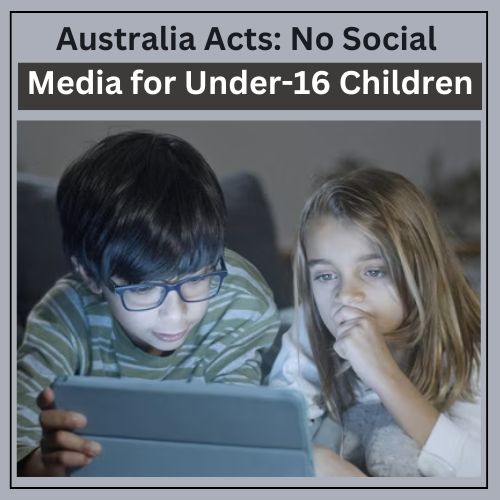Introduction
Social media has been the buzzing hive of teen activity for over a decade, but Australia is flipping the script with a groundbreaking new law! Kids under 16 are officially banned from using social media. This bold move, a first-of-its-kind anywhere in the world, has sparked conversations about safety, freedom, and digital responsibility. If you’re curious about why Australia is taking such a stand and what it all means, let’s dive in.

What’s the Deal with This Ban?
In a world-first, Australia is putting its foot down when it comes to kids and social media. The new law prohibits anyone under the age of 16 from creating accounts or using platforms like Instagram, TikTok, Snapchat, and others. The goal? To protect young people from the darker side of social media while encouraging healthier habits.
The ban isn’t just an empty promise—it comes with serious measures to ensure compliance. Social media platforms will now be required to implement strict age-verification systems, potentially using government-backed identification methods. For parents and guardians, this law adds a new layer of security and peace of mind. Implementation is rolling out over the coming months, and the world will be watching to see how this pans out.
Why Is Australia Saying “No” to Kids on Social Media?
Let’s face it—social media isn’t all sunshine and hashtags. Studies have shown alarming links between excessive social media use and increased anxiety, depression, and low self-esteem in young people. Throw in the risks of cyberbullying, exposure to inappropriate content, and online predators, and it’s easy to see why Australia felt the need to step in.
This ban is rooted in a desire to prioritize the mental health and safety of children. By limiting early exposure to these platforms, Australia hopes to give kids more time to focus on real-world interactions, education, and hobbies. It’s a call to action for creating a digital environment that uplifts rather than harms its youngest users.
What Does This Mean for Social Media Giants?
The new law isn’t just a wake-up call for parents—it’s a full-blown alarm for social media platforms. Companies like Meta, ByteDance, and Snapchat will now have to implement robust systems to verify users’ ages. Think strict sign-up requirements, ID verification, and penalties for failing to comply.
For tech giants, this could be a logistical headache. But it also represents an opportunity to lead in ethical innovation. By designing safer spaces for young users—or entirely kid-friendly platforms—they can rebuild trust and cater to a broader audience. Whether they embrace or resist these changes will likely shape the future of social media regulation worldwide.
What Are People Saying About It?
Let’s just say, opinions are flying faster than trending tweets! Many parents are cheering Australia on, grateful for a policy that addresses their concerns about online safety. Educators and child psychologists are also supportive, noting the positive impact this could have on kids’ mental and emotional well-being.
On the flip side, critics argue the ban may be difficult to enforce. Teens are tech-savvy, and some will likely find ways around the restrictions through fake accounts or VPNs. Others worry it limits kids’ access to valuable educational content and connections. The debate highlights how complex the digital landscape truly is.
How Does Australia’s Ban Compare Globally?
Australia isn’t the first to grapple with social media’s impact on kids, but it’s certainly the boldest. In other countries, regulations typically focus on content moderation or parental controls. For example, the EU’s GDPR and the US’s COPPA set age limits for data collection but stop short of outright banning access.
This new law is a dramatic step forward, signaling a shift toward prioritizing safety over platform profits. It’s a move that could inspire other nations to rethink their policies. If Australia succeeds, it could pave the way for a global reimagining of social media for young people.
The Challenges Ahead
Of course, such an ambitious policy isn’t without hurdles. One major question is enforcement: How will the government and platforms ensure kids don’t simply lie about their age? Tech-savvy teens have been bypassing online restrictions for years, and this will be no exception.
Another challenge is balancing protection with freedom. Critics argue the ban might isolate kids from their peers, especially in a digital age where online connections are often the norm. Policymakers will need to monitor the situation closely to address any unintended consequences.
The Brighter Side: What Could Go Right?
While the ban has sparked debate, its potential upsides are undeniable. By stepping back from social media, kids may experience fewer mental health challenges, improved self-esteem, and better focus on academics and personal growth. Imagine a world where young people spend more time outdoors, exploring hobbies, and building real-world relationships!
Moreover, this move could push tech companies to innovate responsibly. Platforms may develop safer, more age-appropriate spaces for young users, fostering a healthier online culture. The ripple effect could benefit not just kids but everyone who interacts with social media.
What’s Next for the Digital World?
Australia’s bold decision is sure to shake up the digital landscape. It’s a call to action for parents, policymakers, and tech companies to work together in creating a safer internet. If this law proves successful, it could set a new global standard, encouraging other countries to take a stand on youth digital safety.
But the journey doesn’t end here. Continuous evaluation will be key to ensuring the policy remains effective. By staying flexible and open to feedback, Australia has the chance to lead a movement that prioritizes kids’ well-being in a hyper-connected world.
So, what do you think? Whether you’re for or against the ban, it’s clear that Australia is sparking an important conversation about how we raise and protect the next generation. Let’s keep the discussion going—after all, the future of social media might just depend on it!
